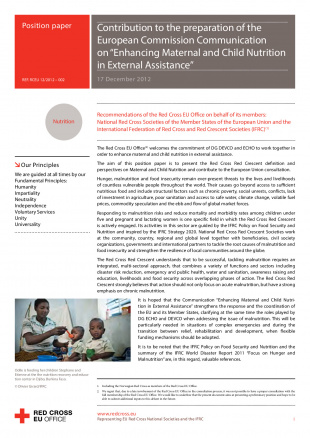Enhancing maternal and child nutrition in external assistance
The Red Cross EU Office welcomes the commitment of DG DEVCO and ECHO to work together in order to enhance maternal and child nutrition in external assistance.
The aim of this position paper is to present the Red Cross Red Crescent definition and perspectives on Maternal and Child Nutrition and contribute to the European Union consultation.
Hunger, malnutrition and food insecurity remain ever-present threats to the lives and livelihoods of countless vulnerable people throughout the world. Their causes go beyond access to sufficient nutritious food and include structural factors such as chronic poverty, social unrests, conflicts, lack of investment in agriculture, poor sanitation and access to safe water, climate change, volatile fuel prices, commodity speculation and the ebb and flow of global market forces.
The Red Cross Red Crescent is actively engaged in responding to malnutrition risks, and reducing mortality and morbidity rates among children under five, as well as pregnant or lactating women. Its activities in this sector are guided by the IFRC Policy on Food Security and Nutrition and inspired by the IFRC Strategy 2020. National Red Cross Red Crescent Societies work at the community, country, regional and global level together with beneficiaries, civil society organisations, governments and international partners to tackle the root causes of malnutrition and food insecurity, and strengthen the resilience of local communities around the globe.
The Red Cross Red Crescent understands that successfully tackling malnutrition requires an integrated, multi-sectoral approach. Across overlapping phases of action, it is necessary to combine a variety of functions and sectors including disaster risk reduction, emergency and public health, water and sanitation, awareness raising and education, livelihoods and food security. The Red Cross Red Crescent strongly believes that action should not only focus on acute malnutrition, but have a strong emphasis on chronic malnutrition.
It is hoped that the Communication “Enhancing Maternal and Child Nutrition in External Assistance” strengthens the response and the coordination of the EU and its Member States, clarifying at the same time the roles played by DG ECHO and DEVCO when addressing the issue of malnutrition. This will be particularly needed in complex emergency situations, and during the transition between relief, rehabilitation and development, when flexible funding mechanisms should be adopted.
It is to be noted that the IFRC Policy on Food Security and Nutrition and the summary of the IFRC World Disaster Report 2011 “Focus on Hunger and Malnutrition” are, in this regard, valuable references.
We regret that, due to a late involvement of the Red Cross EU Office in the consultation process, it was not possible to have a proper consultation with the full membership of the Red Cross EU Office. We would like to underline that the present document aims at presenting a preliminary position and we hope to be able to submit additional inputs to this debate in the future.


